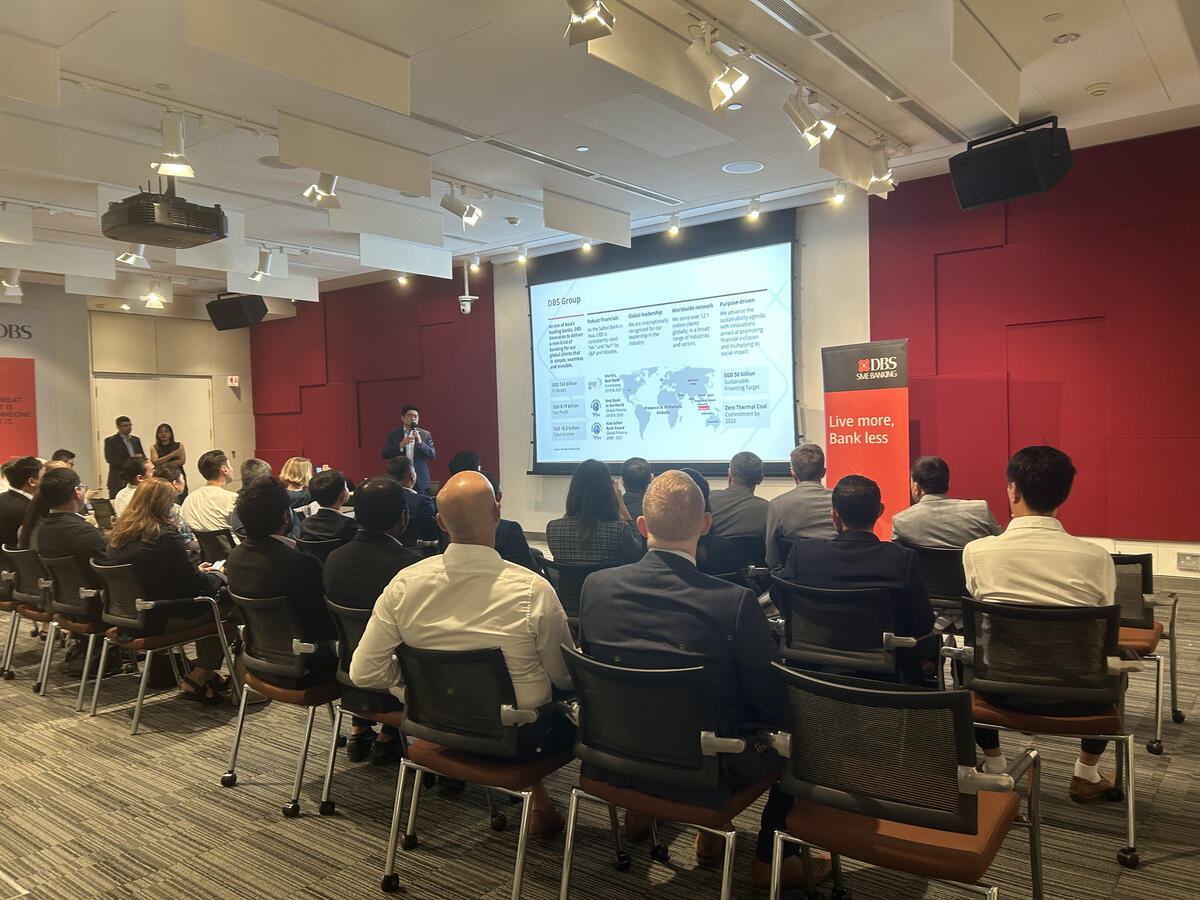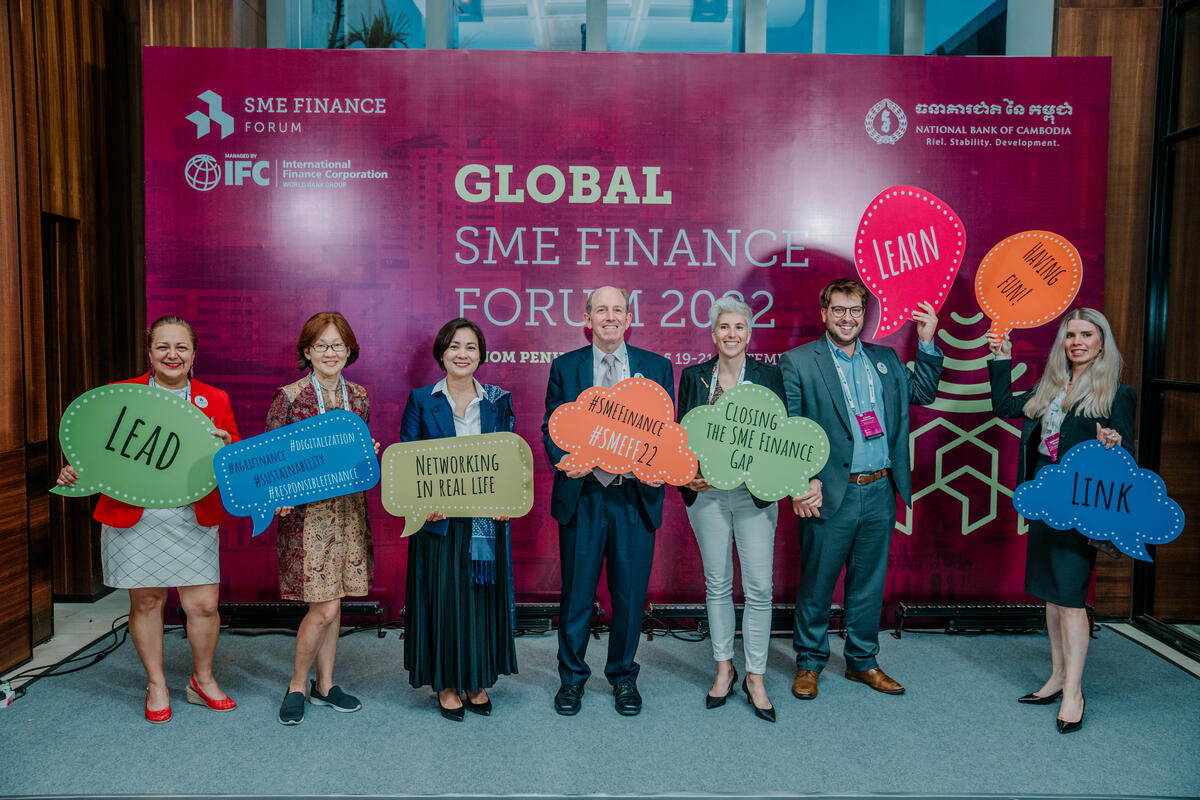Blog
Digital Marketplaces, and How to Survive COVID-19

A summary of SME Finance Virtual Marketplace - Second Session - Fintechs
A study published by Cambridge Centre for Alternative Finance, Cambridge Judge Business School, highlighted that “60% of all financial technology firms at the global level are launching new products, services, and features during COVID-19.”
With the purpose of adding value to its membership offering, the SME Finance Forum developed the “SME Finance Virtual Marketplace” to provide members with a match-making platform to foster partnership and collaboration among financial institutions, investors, development finance institutions and fintechs.
Members can explore different offerings such as investment products, advisory services, and technology solutions. Different from most SaaS platforms where there is only one offeror providing services, this digital marketplace may be seen as a NaaS (“networking” as a service), where we facilitate the interaction between a network of member institutions, connecting them with other interested members and non-member institutions.
According to a Finextra article published in 2020, marketplaces are here to stay and tied to concepts like the “gig-economy”, the “sharing-economy” and the “API-economy”, with specific dynamics and characteristics that differs from traditional software solutions.
In our latest publication Crowdsourcing the Future of SME Financing, in which more than 50 SME practitioners around the world ventured their visions on the future, Joel Muhumuza, a digital financial services specialist leading Uganda and Kenya markets for member JUMO, reflected on marketplace providers as the natural providers of financial services, becoming the “new banking service” only benefitting and helping SMEs bridge the gap in access to finance. For Nadia Sood, CEO of member CreditEnable, the future is bright for multi-lateral managed marketplaces, where efforts are focused on improving customer experience for borrowers, reducing risk and costs for lenders to serve the medium-sized loan segment.
For member Mercado Libre, an e-commerce industry leader and Big Tech in Latin America, partnerships and technology are key to devise a new ecosystem to interact with financial institutions and banks.
Before COVID-19, marketplaces accounted for 50% of global online sales—$2 trillion on the top 100 sites, according to a McKinsey article. In their view, in order to remain competitive, companies should develop sustainable marketplace strategies as part of a broader channel strategy.
COVID-19 has highlighted the important role of fintechs in advancing digitization of the whole financial services ecosystem, especially in providing services like financial management, banking services, lending, accounting, e-payments, insurance, to name a few. Providing SMEs with the digital tools they need meant for most SMEs the opportunity to advance their business, and for many of them, the chance to survive during the pandemic.
With that in mind, the SME Finance Forum organized the second marketplace session, convening a group of seven fintechs to showcase their products on the SME Finance Virtual Marketplace. In this article, we summarize the main takeaways from the session.
Solutions that save time, money and increase data accuracy!
Apoidea has created its own revolutionary artificial intelligence tool to digitize documents used by financial institutions, banks and insurance companies, documents include both SMEs and individuals’ financial and bank statements. The company leverages machine learning techniques in “natural language process” to search, aggregate and process a variety of financial information. What does it mean, for example, for commercial banks? Document Intelligence is the answer. They help commercial banks and credit rating agencies reduce by 95% the time spent on manual data input and analysis process. Its benefits: streamlined onboarding and KYC, credit assessment and improved risks monitoring, eventually reducing human error and processing time by 90%.
BizCapital is the digital financial hub for Brazilian SMEs. Its solution “Biz” helps small entrepreneurs access financial services to grow their businesses and meet their financial obligations and manage their businesses and their cash flows. The solution provides fast and cheap digital access to open an SME bank account within minutes with no monthly fees, unlocking more credit as bank account is used. Their solution includes a unique lead scoring algorithm that optimizes performance improving underwriting over time. What are they proud of? The company has disbursed over 13,500+ loans with over one million applications, and processed bank accounts in 9 minutes, and loans in 39 minutes.
Rong360 Jianpu Technology Inc. leverages deep data insights and proprietary search, recommendation, data and risk technology to provide users with personalized search results and recommendations that are tailored to each user’s particular financial needs and risk profile. Their open platform reached 150 million registered users and offers more than 200,000 financial products. How is their platform unique? They have created an ecosystem that has transformed the way users discover financial products, providing them with more choices, better terms and greater convenience.
How to reduce risks and costs
Fern Software, an international SaaS FinTech Solutions provider, has a global presence with over 300 sites in 50+ countries. Their solution, Quantum AI, is a loan decision engine that creates multi-platform loan applications that integrate with many other apps. The approval decision leverages data from existing core systems to intelligently interpret risk profiles from other customers’ behavior. It is powered by Salesforce and integrates third-party online apps such as Open Banking, electronic signature, SMS and external credit reference agencies. What is so exceptional about this solution? "Using Artificial Intelligence to carry out dynamic risk assessments, Quantum AI can accurately predict with a precision of 92,7% in minutes, greatly reducing overhead costs and engaging more with borrowers in providing a truly customized loans service."
One-stop shop for financial services
Fidor Solutions offers a set of out-of-the-box human-centered banking services, from onboarding, up to servicing, collections, and loyalty. They enable banks to easily mix and match products & services while maintaining a reasonable cost of operations at scale. What do they bring? An array of products from digital lending, engagement loyalty & rewards and payments, mobile banking, e-wallet and retail and SME banking, to marketplaces and sandboxes, API banking plug & play, and advisory services.
Fintech Group systems facilitate seamless integration and inter-operability to promote payment systems, digitalization, e-commerce and open banking in Africa. They provide middleware that allow businesses to connect their system applications without the need to write programming code, partnerships for open banking services to non-customers in a controlled and secure channel through initial sandbox lab, among other services. What is so special about them? The company has been created 28 years to fill a gap that then existed between the integration of businesses and technology.
Waynbo is a platform developed by Papersoft, for the branchless distribution of services in Africa. In other words, their end-to-end software provides quick to market solutions and allows service companies to manage their agency channels (agency banking channel and telcos’ networks of agents) as well as remote field teams in an integrated system. How are they different? They provide a digital field application for agents or remote staff to improve customer onboarding processes and compliant sales. The digital field application includes a marketplace for financial services providers and other digital services, which promotes financial inclusion and facilitates the delivery of new services anywhere in the last mile context.
About the participating institutions
Apoidea is an AI fintech company that extracts insights among unstructured texts such as financial statements to improve the efficiency of credit lending and KYC process of financial institutions in Hong Kong and Singapore.
BizCapital is a small business digital bank disrupting the Brazilian market helping micro and small entrepreneurs with resources to thrive. The company has raised US$ 22.6mn in equity and US$ 50mn through loan funding vehicles, backed by local and international investors.
Fern Software is a key provider of high-quality banking solutions at a reasonable cost to MFIs, Credit Unions, Development Banks, Low Income Social Housing Funds, National Banks, National Credit Associations, Social Enterprise Funding Foundations, Village and Rural Banks.
Fidor Solutions is part of Sopra Banking Software company, specializing in digital banking, including middleware solutions, community based-banking, customer support, marketing and customer acquisition services delivered in a hosted or cloud environment.
Fintech Group is a fintech with operations in in 16 African countries delivering cutting edge solutions mainly in the financial services industry. They have provided technology solutions to 200+ financial institutions.
Rong360 Jianpu Technology Inc. is a leading independent open platform for discovery and recommendation of financial products in China and Southeast Asia. Rong360’s mission is to become everyone’s financial partner, empowering consumers/SMEs(users) and enabling financial services providers to better serve users.
Waynbo by PaperSoft is an international company with offices across Nigeria, Mozambique, the Democratic Republic of Congo, Portugal, and the United Kingdom. They focus on Agency Banking and Agent Network solutions, promoting access to basic services and financial inclusion in Africa.










